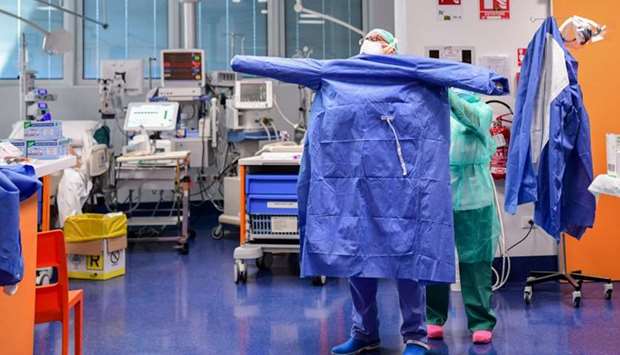Nurses make up new intensive care beds as fast as possible, yet once they come, patients gasping their last in Brescia, the north Italian city ravaged by the coronavirus.
Situated in the heart of Italy's hard-hit Lombardy region, at the foot of the Alps, Brescia saw the highest daily rise in case numbers on Tuesday, compared to the rest of the country.
The 382 new cases brought the total number of infected to 3,300.
"Our facility now hosts over 300 coronavirus patients, 51 of whom are in intensive care," Alessandro Triboldi, director of the Poliambulanza hospital, told AFP, as exhausted doctors checked patients' vital signs.
Gurneys are wheeled quickly and quietly down the corridors by nurses in protective gear, covered almost head to toe, only their necks and ears exposed.
Machines emit two or three-toned beeps as staff help the newly-arrived patients, wrapped in gold foil emergency blankets, off the gurneys and into beds.
The sickest lie intubated, drips feeding medicine directly into their veins, their torsos and legs bare.
"There are people who come from home to the accident and emergency room and are already in very serious conditions," said Giuseppe Natalini, the hospital's head of intensive care.
"They are unable to breathe, are wheezing and have no oxygen in their blood, so they need to be treated quickly".
The coronavirus epidemic began in Italy's Lombardy region, where more than 16,000 people are currently infected and some 1,640 people have died.
While nearby Bergamo has the highest number of cases, the virus appears to be spreading faster in Brescia.
The city is on high alert. Everyone is scanned on arrival at the Poliambulanza, to check their body temperature.
Freshly made beds line the corridors, waiting for the next wave of patients.
The hospital is caring for people of all ages, but "the elderly and those with pre-existing conditions are the ones who get seriously ill.
"These are the patients who cannot make it," department of medicine head Tony Sabatini said.
As ambulances screech to a halt outside, sirens blazing, the sheer number of patients is forcing doctors to decide which cases are worth pursuing.
"Sometimes you have to weigh the chances of success against the patient's condition," A&E head Paolo Terragnoli said, his plastic protective googles pushed up onto his forehead, and his head bowed.
"We try to do our best for everyone, while doing an extra something for those who have better chances."
Beyond the hospital's sleek white and grey walls, the virus continued its silent and invisible rampage across the Brescia province.
An old people's home in Quinzano said Wednesday some 18 of its residents had died since the beginning of the outbreak, including five in the past 24 hours

A medical worker wearing a face mask is helped put on protective gear inside the new coronavirus intensive care unit of the Brescia Poliambulanza hospital, Lombardy
